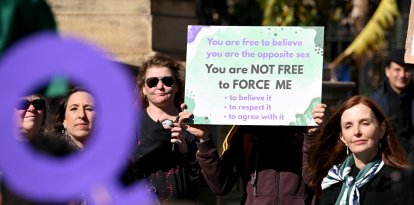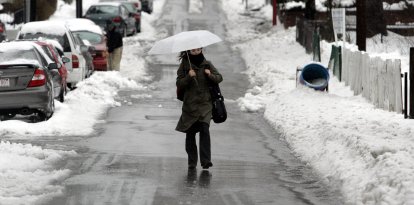California lawmakers block bill to make it a felony to buy 16- and 17-year-olds for sexual purposes
Assembly Bill 379 seeks to align penalties for sex traffickers with those for consumers.

Poster against child sex trafficking.
Lawmakers on the Assembly Public Safety Committee in California are blocking a bill that would make it a felony to buy 16- and 17-year-olds for sex.
The bill to combat human trafficking and child sex trafficking is now targeting consumers in an effort to win passage of the legislation.
State Assemblywoman Maggy Krell, Democratic chairwoman of the committee, agreed to remove a clause from Assembly Bill 379 that states that those who purchase 16- and 17-year-olds for sex would face felony charges, leaving the solicitation of such minors by adults to be treated as a misdemeanor.
AB 379, as it is known, will advance next week to debate.
It is the latest development in an issue that has been raging for more than a year at the state capitol as lawmakers target only criminals who purchase children for sexual purposes.
In 2024, an unsuccessful attempt was made to make it a felony to purchase children under the age of 18 for sexual purposes
In 2024, Republican state senator Shannon Grove introduced the proposal to make it a felony to purchase children under the age of 18 for sexual purposes for the first time. Prior to this action, it was a misdemeanor in the state.
Grove and other lawmakers in the Senate and Assembly reached what Democrats called "a compromise" last year to allow the felony charge to only apply to those who purchase minors under 16 for sexual purposes.
However those who purchase minors under 16 and 17 currently could face either a misdemeanor or a felony, leaving the decision up to local prosecutors.
The law also requires older teens to prove they are being trafficked.

Society
Trump administration reforms 'Unaccompanied Alien Child' policy to prevent child trafficking
Verónica Silveri Pazos
Traffickers, not buyers, face the harshest consequences
For her part, Assemblywoman Krell, who spent two decades working on trafficking cases for the California Department of Justice, and introduced the measure this year, argued that the law should also be consistent for buyers.
Currently, traffickers, not buyers, face the harshest consequences when convicted of trafficking under 18.
The new bill repeals portions of a 2022 California law that decriminalized loitering for the purpose of prostitution. It restores penalties for those who loiter with the intent to buy someone, or for those she deems "car trespassers."
These offenders would face a misdemeanor and pay a fine of up to $1,000 that would go to a trafficking survivor fund.

























